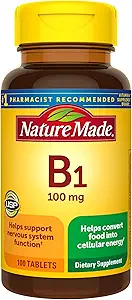Vitamin B1 (thiamine) supplements are a water-soluble vitamin that plays a fundamental role in numerous bodily functions. Its historic discovery is intrinsically linked to the search for solutions to serious illnesses affecting sailors on restricted diets and poultry fed polished rice, underscoring its essential nature for life. This initial historical context highlights the critical importance of thiamine in preventing deficiency diseases, which in the past represented significant public health problems. Even in modern, generally well-nourished populations, maintaining adequate intake remains crucial.
In the body, thiamine occurs in various phosphorylated forms, including thiamine monophosphate, thiamine diphosphate/pyrophosphate (TDP/TPP), and thiamine triphosphate, in addition to free thiamine. Of these forms, thiamine diphosphate (TDP), also known as thiamine pyrophosphate (TPP), is the principal metabolically active form of the vitamin. The body actively converts thiamine into its functional form, TDP/TPP, indicating its essential role in cellular processes. It’s important to note that this conversion can be affected by various factors, such as alcohol consumption.
Why Should We Consume Vitamin B1?
Energy Metabolism: Thiamine facilitates the conversion of carbohydrates into glucose, which is the primary energy source for the brain and nervous system. It is also essential for the metabolism of pyruvate, an important molecule in several chemical reactions in the body. Vitamin B1’s role in glucose metabolism is especially critical for the functioning of organs with high energy demands, such as the brain. Deficiency can directly impact cognitive function and neurological health. The brain’s dependence on glucose and thiamine’s role in its metabolism establish a direct link between thiamine intake and brain health.
Nervous System Function: Thiamine is involved in the conduction of nerve signals, muscle contraction, and the balance and flow of electrolytes in and out of nerve and muscle cells. Adequate thiamine intake is vital for maintaining proper nerve function and muscle coordination. Deficiency can manifest in neurological symptoms such as numbness, tingling, and loss of reflexes. The connection between thiamine and nerve and muscle function explains the physical symptoms associated with its deficiency.
Thiamine is also involved in cell growth, development, and overall function.
What is the Best Way to Consume Vitamin B1?
Thiamine occurs naturally in many foods and is added to some fortified foods.
Good sources include whole grains and fortified grain products (bread, cereals, pasta, rice). Brown rice contains more thiamine than unenriched white rice. The difference in thiamine content between brown and white rice highlights the impact of food processing on nutrient levels and encourages the consumption of whole grains.
Meat, especially pork, is an important source. Beef and poultry also contain thiamine. Liver is another good source.
Legumes (such as black beans, soybeans, lentils, peas, and dried beans) are rich in thiamine.
Nuts and seeds (sunflower seeds, macadamia nuts, pistachios, flaxseeds, and hemp seeds) also provide thiamine.
Fish (trout, salmon, tuna, and mussels) contain thiamine.
Some vegetables and fruits contain thiamine, such as peas, bananas, oranges, cauliflower, potatoes, asparagus, kale, acorn squash, and corn.
Yogurt contains thiamine.
Yeast extract, wheat germ, and bran are also good sources.
Heating, cooking, and processing can destroy thiamine in foods. Boiling foods in water can cause significant loss.
best vitamin B1 supplements

Review of this product: This vitamin B1 from Nature Made has demonstrated extraordinary benefits for both humans and pets. The results are remarkably rapid, with many users reporting increased energy from the first day of use.
What stands out most is its effectiveness in complicated cases. One impressive testimonial recounts how it completely revitalized a cat with health issues (loss of appetite, vomiting, and diarrhea) in just 24 hours, achieving a recovery the veterinarian considered unlikely without expensive testing.
For human users, it offers equally significant benefits: it maintains energy throughout the day, improves circulation, and, surprisingly, some report that it eliminates chronic nightmares.
The tablet is small and easy to swallow, a feature highly appreciated by those who take multiple supplements. Unlike other B vitamins, it does not cause unpleasant burps or stomach upset.
Nature Made is a trusted, doctor-recommended brand with excellent value. Regular customers keep it constantly restocked, confirming its value as an essential supplement for daily well-being.

Review of this product: This Benfotiamine supplement has proven to be exceptionally versatile and effective, according to numerous user reviews. Its unique ability to neutralize methylglyoxal, a molecule associated with various non-infectious diseases, stands out.
Users report notable benefits for daily energy, making it especially useful for those unable to consume traditional stimulants. It also shows impressive results for swelling in feet and legs after long workdays, acting quickly after intake.
Several reviews highlight its effectiveness for specific conditions such as tinnitus, memory problems, diabetic neuropathy, and cardiovascular health. Additionally, users with autoimmune conditions report significant improvements in their symptoms.
The Pure Encapsulations brand is highly valued for offering a product free of common allergens (gluten, soy, and dairy free) with small, easy-to-swallow capsules. The price-performance ratio is considered excellent.
With numerous verified purchases and medical recommendations, BenfoMax is positioned as a trusted supplement with benefits that exceed users’ initial expectations.
